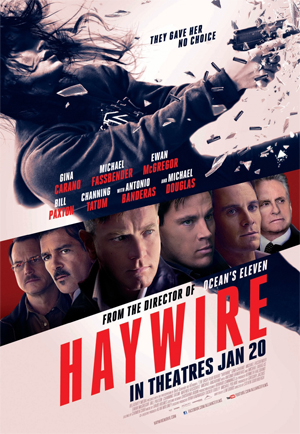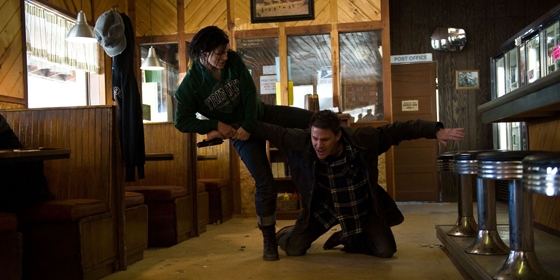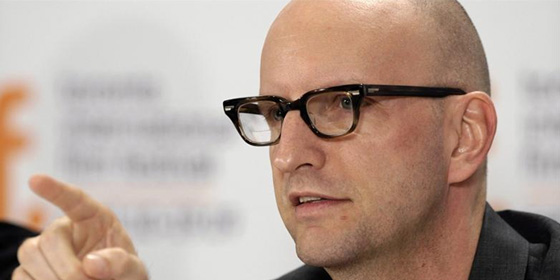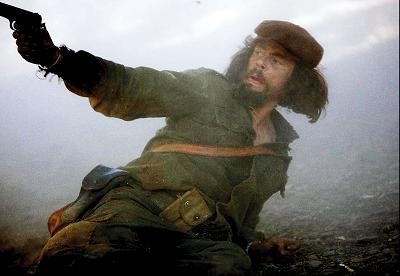The most eclectic director working in Hollywood tries his hand at a spy thriller.
Steven Soderbergh is the resident chameleon of US cinema, who thrives on jumping between genres and styles.
Since his mainstream creative rebirth in the late 1990s he has mixed mainstream commercial success (the Ocean’s trilogy) with more challenging fare (Solaris, The Good German, Che) and digital experimentation (Bubble, The Girlfriend Experience).
Most recently he made an all-star disaster movie Contagion and now he employs a similar trick here with an illustrious supporting cast recruited from his impressive contacts book.
But the real surprise here is the casting of mixed martial arts star Gina Carano in the lead role.
She plays a hired government ‘contractor’ (a veiled reference to Blackwater) who we learn in flashback has been set up by her bosses after jobs in Barcelona and Dublin.
 The impressive supporting cast includes Ewan McGregor, Michael Douglas, Antonio Banderas, Bill Paxton, Channing Tatum and Michael Fassbender.
The impressive supporting cast includes Ewan McGregor, Michael Douglas, Antonio Banderas, Bill Paxton, Channing Tatum and Michael Fassbender.
There aren’t many directors who could pull off this trick – casting a former American Gladiator in a spy thriller alongside some of the most recognisable actors in the world.
But Soderbergh has become highly proficient in navigating the fringes of the mainstream, with occasional leaps right into it.
This on the surface is a very mainstream subject story – essentially a Bourne movie by way of the Ocean’s trilogy.
Old-school action is blended with a knowing globe-trotting humour and a smart script by Lem Dobbs.
There’s nothing too heavy here as it is basically an experiment to combine the breezy style of 1960s spy thrillers like Charade (1963) with the pulp literature of something like The Baroness series from the 1970s.
But a closer examination reveals a more interesting formal experiment to subvert the action genre from within.
Not only do we have a female lead in a movie that isn’t about weddings, but she regularly outsmarts and beats the crap out of every man in sight.
(Mysteriously, the global locations – Ireland, Catalonia and New Mexico – also coincide with places that offer generous tax rebates).
Whilst the basic narrative owes a lot to Bourne (US government assassin goes rogue) there is a deliberate attempt to avoid the ‘chaos cinema’ that has been so influential on the modern action genre.
Serving as his own cinematographer and editor (under his regular pseudonyms) quick edits are rejected and the fights are refreshingly reminiscent of those in 1960s thrillers, when killing another human being didn’t involve slow motion.
Going for a more realistic approach, it rejects the post-Matrix wire ballet or frenzied editing style of the later Bourne films in favour of a more composed and leaner approach.
Keep an ear out too for more believable slapping sounds you actually hear in fights, rather than the overcooked punching effects so beloved of Hollywood.
Soderbergh also apparently altered Carano’s voice in post-production, which makes it an intriguing project from an audio perspective – was the lead actress his very own creative ‘recruit’ to mess with the action genre down to the last detail?
It remains to be seen if she can make the breakthrough into acting full-time, but here she impresses with her imposing physicality and easy charm.
As for the supporting cast, it is something of a slam-dunk for all of them as the screenplay gives each of them plenty of dry humour on which to feast.
There has always been a James Bond influence on the Ocean’s films (e.g. casinos, smooth charm, glamorous locations) and it is here too, although the neat trick is having what essentially amounts to a female 007.
At times the groovy score by David Holmes is a little too close to the vibe he established on those films, but it largely proves a good fit for the material.
In many ways it is reminiscent of The Limey (1999) – another Soderbergh film scripted by Dobbs – which also dealt with revenge, a father-daughter relationship and villains who got beaten up or killed.
Over the last few years Soderbergh has been at the forefront of the A-list directors using digital cameras (others include David Fincher and James Cameron).
Here he has gone for a slightly different look, going for a digital version of the rich anamorphic look beloved of certain ‘classical’ action movies since the 1960s.
The digital workflow used by the production again set new boundaries in producing imagery for relatively low cost, prompting a colleague to say:
“If digital cinema had its own country, Steven would probably be President”
In the week Kodak announced that it had entered Chapter 11 bankruptcy, this feels significant.
It should also be noted that Soderbergh has essentially created a crafty commercial film from inside the system.
With financing from Relativity Media he has managed to make a more audience-friendly counterpart to his artier experiments like Bubble and The Girlfriend Experience.
It is this range that makes him one of the most interesting directors working inside the system.
> Official site
> Reviews of Haywire at Metacritic
> Lengthy Box Office Magazine interview with Soderbergh
> Detailed post on the digital workflow used by the production


